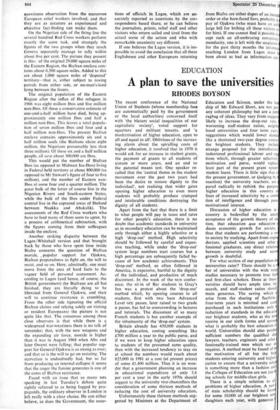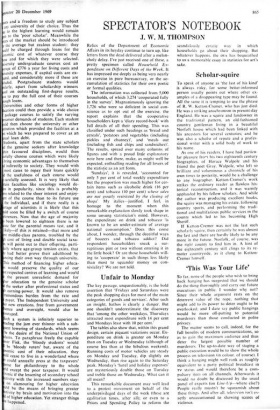EDUCATION
A plan to save the universities
RHODES BOYSON
The recent conference of the National Union of Students (whose membership fees are automatically paid by the government or the local authorities) concerned itself with 'the blatant social inequalities of our capitalistic society', voted support for squatters and militant tenants, and 'a modernisation of higher education, open to all and equal to all'. Oblivious of the increas- ing alarm about the spiralling costs of higher education, it resolved that in 1970 it would ask for an increase in student grants, the payment of grants to all students of sixteen or more years, and an end to the parental means test. One speaker re- called that the 'central theme in the student movement over the past two years had been the desire to restore dignity to the individual', not realising that wider gates opening higher education to even more students will probably produce cramped and intolerable conditions destroying the dignity of all students.
Apart from the fact that there is a limit to what people will pay in taxes and rates for other people's education, there is no doubt that academic standards in university as in secondary education can be maintained only through either a highly selective or a high 'drop-out' method. High selectivity should be followed by careful and expen- sive teaching, while under the 'drop-out' system large numbers start courses but a high percentage are subsequently failed be- cause of low academic achievements. This `drop-out' method, so often followed in America, is expensive, hurtful to the dignity of the individual, and productive of much discontent. In the week of the NUS confer- ence, the sit-in of Bar students in Gray's Inn was a protest about the 'drop-out' method which, by opening courses to all students, first with two bare Advanced Level GCE passes, later raised to two grade o passes, has led to overcrowding in lectures and tutorials. The discontent of so many French students is but another example of the inhumanity of the 'drop-out' system.
Britain already has 450,000 students in higher education, costing something like £700 million a year to the public purse, and if we were to keep higher education open to students of the presumed same quality, then with the increased tendency to stay on at school the numbers would reach about 825,000 in 1981 at a cost (at present prices) of some E1,400 million. Thus it is no won- der that a government planning an increase in educational expenditure of only 3.8 per cent a year in the early 1970s should suggest to the university vice-chancellors the consideration of some thirteen methods of reducing the cost of university education.
Unfortunately these thirteen methods sug- gested by Ministers at the Department of
Education and Science, under the I ship of Mr Edward Short, are not pan any coherent philosophy but are a jum ragbag of ideas. They vary from sugges likely to increase the drop-out rate, worsening staff-student ratios, neigh hood universities and four term years suggestions which would lower standa like a shortened two-year degree course the brightest students. They include strange proposal for the introducti, indentured professional labour and , tions which, through greater selecti‘, motivation and purse, would repla least part of the present grant sysk student loans. There is little sign that the present government, or (judging tv reaction) the university teachers, arc pared radically to rethink the purpo, higher education in this country lines of increased selectivity by a con tion of intelligence and through put, motivational interest.
Discussion of higher - education in country is bedevilled by the unc acceptance of the growth theory of e tion, that education qua education duces economic growth for sociev, thus that students are performing a to society by studying. Apart from engi- doctors, applied scientists and other fessional graduates, any direct relaw between university study and ecor growth is doubtful.
For what section of our population c universities cater? There should be a r ber of universities with the wide ran studies necessary to promote true lea and first-class scholars. Dons at these versities should have ample time for search, and staff-student ratios should main generous. The saving which c arise from the sharing of facilities four-term years is minimal and cou purchased in such institutions only reduction of standards in the educatt our brightest students, who at the m receive in our sixth forms and univ what is probably the best education world. Universities should also prod sufficient numbers the qualified d lawyers, teachers, engineers and other fessionally-trained men which our requires. A method must be found of the motivation of all but the br students entering university and higher cation to ensure that a university eda is something more than a fashion and the Colleges of Education are not just ing schools for middle-class girls. There is a simple solution to all problems of higher education. A nevi of state scholarship should be intr for some 10,000 of our brightest so daughters each year, with generous
In
is and a freedom to study any subject any university of their choice. Thus the to the highest learning would remain to the 'poor scholar'. Meanwhile the es of the market should be introduced the average but zealous student: they uld be charged through loans for the nomic cost of whatever course they ose and for which they were selected.
■ ersity undergraduate courses cost an rage of £776 a year for living costs and ersity expenses, if capital costs are ex- d, and considerably more if these are uded. Postgraduate students would lady, apart from scholarship winners on outstanding first-degree results, t to pay the full cost of their courses ough loans.
Universities and other forms of higher ucation could then provide a wide choice package courses to satisfy the varying sumer demands of students. Each student uld then choose the university or other titution which provided the facilities at a t which he was prepared to cover as an ual loan debt.
Students, apart from the state scholars
d the genuine seekers after knowledge thin favoured disciplines, would then dully choose courses which were likely bring economic advantages to themselves indirectly to society. They would wish most cases to repay their loans quickly the usefulness of each course would carefully assessed. It is very likely that am n faculties like sociology would de- e in popularity, since this is probably re related to the sheer interest and enjoy- nt of the course than to its future use the individual, and if there really is a rtage of scientists it is likely that this lid soon be filled by a switch of course terences. Now that the age of majority been lowered to eighteen there is no use for the parental means test, and it kely—if this is retained—that more and re middle-class parents, troubled by the h cost of living and double social taxa- n will point out to their offspring, parti- Irly where age-group tension exists, that , had better prove their adulthood by cing their own way through university. is method of financing higher educa- would preserve the quality of our st respected centres of learning and would the present unrealistic demand for her education to the genuine scholar the seeker after professional status and h earning-power. It would also remove tremendous burden from the rate and payer. The Independent University and er new creations, free from government uence and oversight, would also be ouraged.
ch a system is infinitely superior to eading the jam ever thinner with a sub- uent lowering of standards, which seems be the desire of the National Union of dents. To paraphrase freely the capable or Fisk, the 'bloody students' would be 'bloody voters' but, aware of the nomic cost of their education, they Id cease to live in a wonderland where could annually press at the taxpayers' nse for philanthropy to the whole Id except the poor taxpayer. It would ronie if the lessening of secondary school ivity with the increased numbers stay. On clamouring for higher education old .1ae the means of bringing greater ivity by brain and motivation into the of higher education. Yet stranger things e happened.



































 Previous page
Previous page